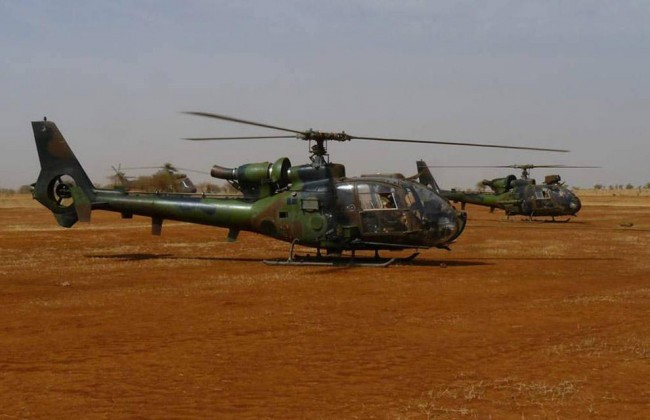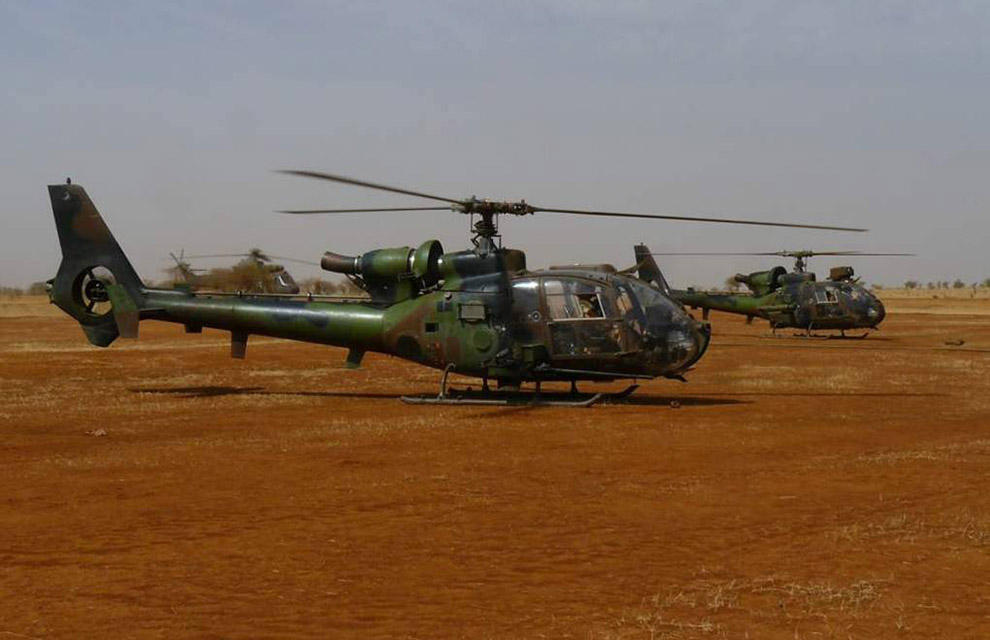Operation Serval in Mali launched. Details of the forces involved

(BRUXELLES2 to Paris) The "Serval" operation to secure Mali, initiated by France, includes at least four elements of action. The first element is the presence of important vectors of intelligence, which made it possible to follow on the ground the advance of the 'rebel groups from the north' (*). The second element is terrestrial and a directly operational vocation. He was hired very early. The third element is aerial (helicopters, airplanes) and consists of targeted air strikes (of the type carried out in Libya). Finally, the fourth element is still in the ramp-up phase, it is a question, with several companies, of securing Bamako, the Malian capital. Without forgetting the elements of command.
It is thus, in fact, several thousand men (and women) who are mobilized and on alert at 2, 12 or 24 hours in France, as in Chad, Senegal, Gabon, Burkina-Faso, Côte d' 'Ivoire or in Dibouti (in most African bases or presences). It is therefore not a "small" operation.
Support for Malian forces on the ground
« Very quickly " - specified the Minister - France sent a " first unit in Mopti / Sévaré to support the tactical staff and Malian combat units. Its mandate was to support the operations of the Malian army from the outset explains the Minister. This unit thus seems to have left earlier than what was officially said. Transport planes also landed in Sédaré, making several rotations (6 in all according to our information) bringing equipment and men. This confirms the information published since yesterday by AFP.
Airstrikes
The situation becoming critical, the use of aerial means (helicopters, planes) was authorized on Friday by the President of the Republic. " Airstrikes occurred last night and this morning on several objectives: areas of penetration and concentration of terrorists confirmed the Minister.
Friday 16 p.m. Attack helicopters are engaged
The first to be engaged were the Gazelle HOT and Gazelle 20mm helicopters from the 4th Special Forces helicopter regiment (4th RHFS). On Friday (January 11), around 16 p.m. they went into action. They " first targeted a column of terrorist elements heading towards Mopti and Sévaré. A raid carried out in support of the Malian armies, which allowed the destruction of several units (NB: 4 vehicles destroyed) and halted their advance towards the city. The column of terrorist elements had to retreat explains Le Drian.
Night from Friday to Saturday. Mirage Strikes
Mirages then struck, on the night of Friday to Saturday. According to our information, 4 Mirage 2000 Ds and 2 C135 type refueling planes were thus engaged (each ensuring the supply of one of the Mirage patrols, two Atlantique 2 planes (one coming from Dakar, the other from mainland France) loaded intelligence, observation and target guidance.
Other air assets on alert
If needed, " other means of hunting may be sent on site, particularly from mainland France”. Several airbases (Mont de Marsan, Saint Dizier, Istres, etc.) are thus on alert. And it is not excluded that Rafales can be engaged. It is the base of N'Djamena which serves as a point of action. The air group of the Epervier force currently includes, according to the General Staff of the armies, two Mirage F1 CR (reconnaissance), six Mirage 2000D (strike), 3 tankers C-135, 2 transport planes (1 C130 and 1 Transall C160).
First assessment
These attacks were carried out by elements of the Epervier Tchad system, reinforced". They allowed - according to an initial assessment drawn up by the officials - " to destroy vehicles in Konna, as well as a command post and means sheltered in hangars in the Konna region”.
On the French side, we deplore the loss of a man who fell during the engagement. A pilot officer - Lieutenant Damien Boiteux of the 4th RHC (combat helicopter regiment) in Pau - was hit " by small arms fire from the ground "" Mortally injured, he was evacuated to the nearest medical facility (Nb: Mopti hospital), where he died (NB: two hours later). »
Securing Bamako
Several French units have deployed in the Malian capital to ensure the protection of Bamako and ensure the safety of nationals ". (...) This reinforcement is in progress. This is a device bringing together several companies. " There are a few hundred French soldiers engaged. About 300 according to our information, whose objective is to provide support at the airport, rear medical support if necessary, and include command and communication elements if necessary (a DICOD officer has thus been deployed on square).
According to the General Staff of the armies, 200 soldiers were thus "projected" to Bamako by C130 and Transall, from the land group of the Epervier force: "porpoises" of the 21st marine infantry regiment of Fréjus (21st RIMa) and a platoon of legionnaires from the 1st Foreign Cavalry Regiment of Orange (1er REC). They will be reinforced by a company of the 2nd Marine Infantry Regiment (2nd RIMa) stationed in Auvours-Champagné (near Le Mans) on Saturday (January 12).
Command of the operation
The "Serval" operation is piloted from Paris at the CPCO - the operational control center of the General Staff of the armed forces. As for the FHQ – the tactical command – it is (for the moment) located in a “ other African country an officer told us.
---
(*) This is not an official name but the terminology that B2 has chosen to designate all the rebel, autonomist, Tuareg, Islamist, terrorist and other groups. The official terminology 'terrorists' seems too vague to me and reminds me of the 'bushist' era of everything that was an 'enemy'.

